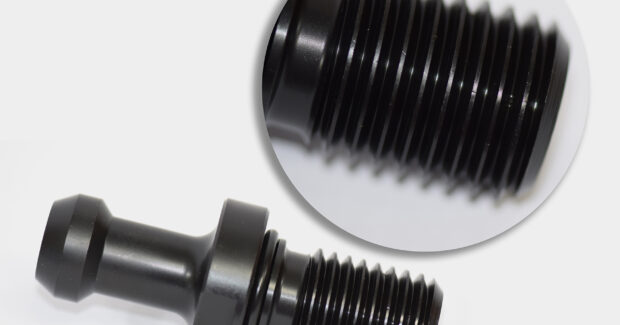Single Point Threading Ensures Strength and Durability of Retention Knobs
TJ Davies forms its retention knob threads using single point threading to Imperial or metric standards, which ensures that the threads are balanced (lead-in/lead-out at 180 degrees) and that full depth is attained for each thread.
Posted: June 5, 2024
Retention knobs are subject to a lot of stress and force when in use, and the threads play a key role in keeping the workpiece firmly gripped. TJ Davies forms their retention knob threads using single point threading to Imperial (Class 2A UNC) or Metric (Class G6) standards. This ensures that the threads are balanced (lead-in/lead-out at 180 degrees) and that full depth is attained for each thread. Attaining full depth provides them with a firmer grip which holds the tooling securely without vibration. Rolling is an alternate means of forming threads; this effectively squashes the steel to form the threads but only to a shallower depth. This shallow depth introduces some play between the retention knobs and the holder, thus transmitting vibration through the knob, which weakens it. In addition to vibration, rolled threads can cause wobbling and misalignment, which can damage the spindle. With enough spindle damage they can snap, causing damage to the workpiece and potentially harming employees. Single point threading eliminates these potential problems and extends the service life of the retention knob. TJ Davies manufactures the industry’s broadest line of retention knobs, with many available for same day shipment.
TJ Davies manufactures every retention knob using American-made 8620 alloy steel that is then machined in-house in a single set-up to ensure concentricity. The use of 8620 ensures that the components will work harden over time, rather than becoming brittle as is the case with retention knobs machined from 9310 alloy steel. After threading is completed, each component is heat treated to 58-62 HRC then treated with hot black oxide to military specifications for protection against corrosion. Each retention knob is magnetic particle tested and then pull tested to 2.5 times the pulling force of the drawbar it is designed for. Certifications maintained for each step and each batch ensure traceability and quality control.
In addition to the 500 plus styles available, TJ Davies has an in-house engineer who can make custom knobs for older machines that are no longer made.




